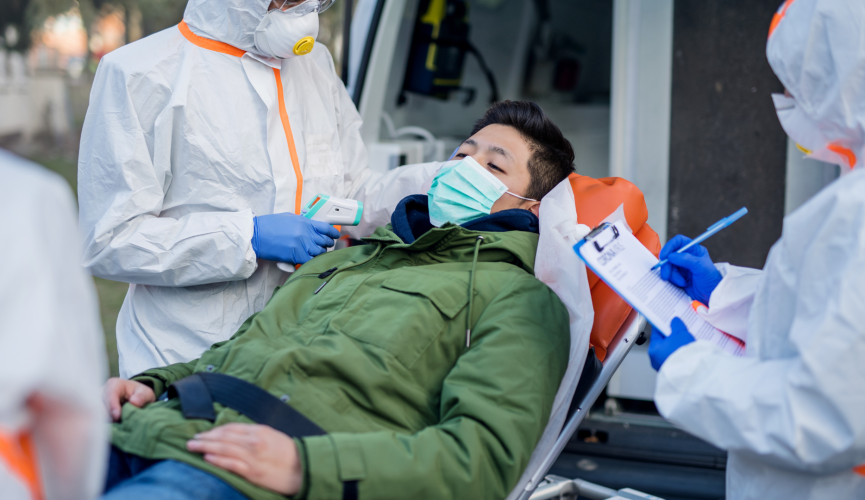Medical emergencies happen, but knowing what to do can make all the difference. In this article, we will explore how we can react better before and after a medical emergency.
What to Do in Case of an Emergency
If we are in the middle of an emergency and cannot get help, we can do a few things to survive. If we have time, try to remember the following:
Stay Calm
If we panic or become overwhelmed, our situation will worsen. Stay focused on what we need to do to stay alive.
Know the Surroundings
If we can’t see or hear anyone else, know where all the exits are and which ones lead outside. If there is a fire, try to exit through the nearest window.
Stay Hydrated
When faced with extreme heat or cold, drink plenty of water and avoid alcohol and caffeinated beverages. These substances will only make us more dehydrated.
Save Energy
When possible, conserve energy by trying not to move too much or speak loudly. Try to keep it as still as possible so we don’t attract attention.
Think Ahead
Plan how we will react if something goes wrong. This might include knowing how to start a fire and where to find medical help.
Common Medical Emergencies
Medical emergencies can encompass a diverse array of issues, including fractured teeth that may require individuals to opt for thornton emergency dentistry or similar services elsewhere; severe diarrhea; high fever; and various other critical health concerns. Below, we’ve provided some examples of situations that fall within this category.
Here is a list of 10 medical emergencies that can be treated at home:
- Chest pain
- Severe shortness of breath
- Uncontrolled bleeding
- Broken bone
- Shock
- Preexisting conditions that worsen during an emergency
- Asthma attack
- Food poisoning
- Urinary tract infection (UTI)
- High fever
First Aid and Treatments
In a medical emergency, know the basics of first aid and how to treat common injuries. Here are some tips for treating minor injuries:
- If someone has a broken bone, place a clean cloth or bandage over the break and hold it with a sturdy object like a book or bottle until the bone heals.
- If someone has cuts, wash them with cold water and soap. Apply pressure to the cut to stop the bleeding.
- If someone has broken or chipped a tooth, give them an icepack to hold against the injury until you can get them to a dentist that offers dental crowns seguin, or wherever is closer for you.
- When there’s heavy bleeding, put a cloth between the fingers and thumb and press against the wound to create a tight seal. Then use another piece of cloth to tie off the edges of the fabric while holding pressure on it.
- If someone is vomiting or having severe diarrhea, give them appropriate liquids (water, broth, fruit juice) and electrolytes (soda water, Gatorade) through an IV if necessary. If they are experiencing chest pain, shortness of breath, or lightheadedness, call 911 immediately.
- If someone has a head injury, remove any obstructions from their airway (eyeglasses, hair) before beginning rescue breathing ( CPR ). If they don’t respond to rescue breathing efforts or show any other signs of life after 15 minutes have passed since the injury occurred, declare them dead and begin formal burial procedures.
When to Call for Help
When in doubt, always call for help! Whether it’s summoning an ambulance or just calling a friend or family member, there are many options available regarding getting professional medical assistance.
Emergencies
In the event of a medical crisis, such as a broken tooth necessitating emergency dental extractions draper ut (and similar urgent procedures in other locales) or even a heart attack or stroke, prompt action is paramount. Dialing 911 immediately becomes imperative to ensure swift access to the essential help and treatment required to address the situation effectively.
They can provide preliminary treatment and stabilize the patient before referring them to specialized doctors or hospitals for further care. While emergency medical services are typically well-trained and efficient, there may be rare instances where mistakes or negligence occur, leading to more medical complications for the patient. In such unfortunate cases, seeking the assistance of a legal expert, like those available at https://www.gadsbywicks.co.uk, can be essential to assess if there are grounds for a medical negligence claim.
Non-Emergencies
If we aren’t experiencing an emergency and think we may have a medical issue that needs professional attention, don’t wait – call our doctor or another healthcare provider. For minor problems, contacting our doctor or another healthcare provider promptly can help us receive appropriate guidance and potentially address the issue at home with their recommendations. However, if the problem appears to be more severe, persistent, or beyond our ability to manage at home, seeking outside help from healthcare professionals is always the best course of action.
Keep Calm and Stay Focused
If we are ever in a medical emergency, the most important thing to do is to stay calm. If we can, tell someone where we are and what happened. Try not to panic; it will only make things worse-breathe in and out, and when all is clear, assess the situation. Most importantly, remember that an ambulance is always on standby should the situation become life-threatening.

